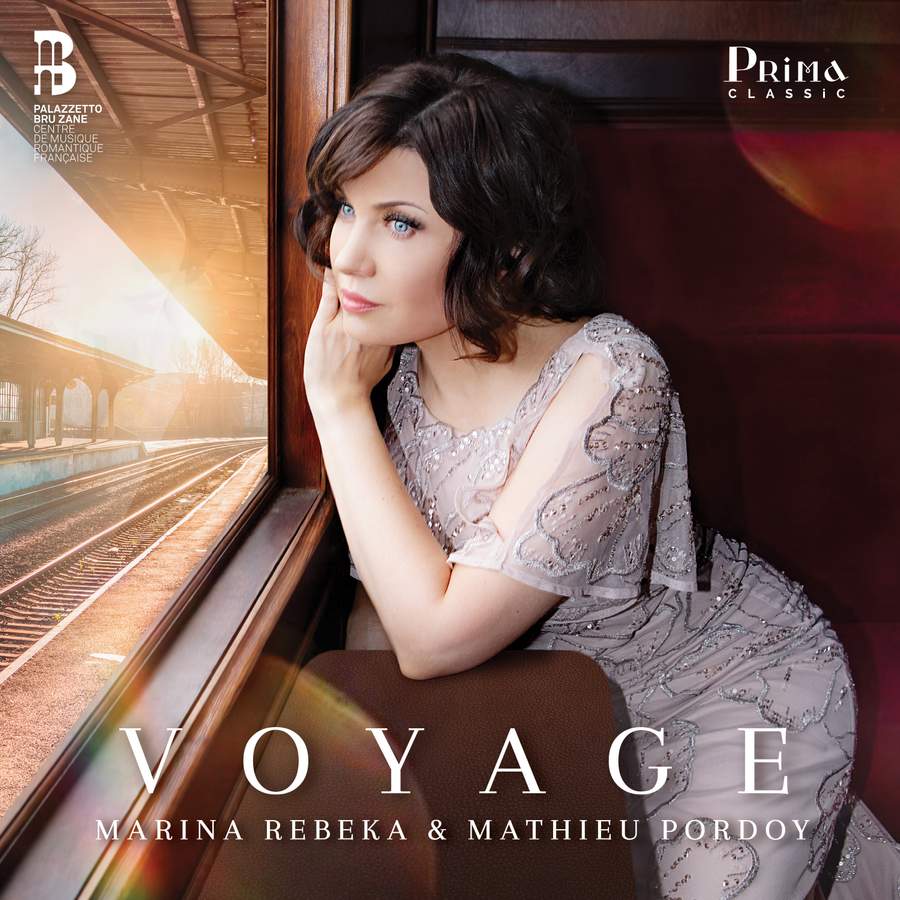Marina Rebeka: Voyage
View record and artist detailsRecord and Artist Details
Genre:
Vocal
Label: Prima
Magazine Review Date: 12/2022
Media Format: CD or Download
Media Runtime: 76
Mastering:
DDD
Catalogue Number: PRIMA014

Tracks:
| Composition | Artist Credit |
|---|---|
| Chanson slave |
Cécile (Louise Stèphanie) Chaminade, Composer
Marina Rebeka, Soprano Mathieu Pordoy, Piano |
| (L')Invitation au voyage |
(Marie Eugène) Henri Duparc, Composer
Marina Rebeka, Soprano Mathieu Pordoy, Piano |
| (4) Songs, Movement: No. 4, Les Roses d'Ispahan (wds. de Lisle) |
Gabriel Fauré, Composer
Marina Rebeka, Soprano Mathieu Pordoy, Piano |
| Oh! Dille tu!. Perché piangi? |
Charles-François Gounod, Composer
Marina Rebeka, Soprano Mathieu Pordoy, Piano |
| Fünf Lieder |
Marie Jaëll, Composer
Marina Rebeka, Soprano Mathieu Pordoy, Piano |
| Rêverie |
Marie Jaëll, Composer
Marina Rebeka, Soprano Mathieu Pordoy, Piano |
| Shéhérazade, Movement: La flûte enchantée |
Maurice Ravel, Composer
Marina Rebeka, Soprano Mathieu Pordoy, Piano |
| Alla riva del Tebro |
Camille Saint-Saëns, Composer
Marina Rebeka, Soprano Mathieu Pordoy, Piano |
| Désir de l’orient |
Camille Saint-Saëns, Composer
Marina Rebeka, Soprano Mathieu Pordoy, Piano |
| La madonna col bambino |
Camille Saint-Saëns, Composer
Marina Rebeka, Soprano Mathieu Pordoy, Piano |
| L’innamorata |
(Michelle Ferdinande) Pauline Viardot-Garcia, Composer
Marina Rebeka, Soprano Mathieu Pordoy, Piano |
| Six Russian Songs |
(Michelle Ferdinande) Pauline Viardot-Garcia, Composer
Marina Rebeka, Soprano Mathieu Pordoy, Piano |
| Chanson indienne |
Charles-Marie(-Jean-Albert) Widor, Composer
Marina Rebeka, Soprano Mathieu Pordoy, Piano |
Author: David Patrick Stearns
Duparc’s invitation to travel is an apt starting point for an enterprising programme with multiple explorations. The programme encompasses French mélodies by composers working outside their native language, often describing foreign vistas that were opening up to Europeans between 1860 and 1890, and with implications of why they were doing so. This first solo recital by the already much-recorded Latvian soprano Marina Rebeka bears the stamp of Palazzetto Bru Zane, which has resurrected many little-known French operas and, on this album, has been of musicological assistance, no doubt with composers such as Marie Jaëll (1846-1925), whose music has been brought to light on the institute’s own label. The starting point is familiarity (Ravel’s much-heard ‘La flûte enchantée’, for one) and the recital ends with Pauline Viardot adapting a Tuscan popular song and setting texts in Russian. Even seasoned Francophiles aren’t likely to have known of the existence of a good half the pieces on this recital.
All of it is worth hearing for different reasons. For all its modesty, the mélodie as a genre is transparent enough that you know immediately when the piece has come from the head more than the heart, or when the music was written out of financial need or inner need. One of the better-travelled composers, Saint-Saëns seems surprisingly superficial in ‘Désir de l’orient’ with unconvincingly kitschy touches in the piano-writing – which speaks to the nature of the musical marketplace at that time and the taste for the exotic. Widor’s ‘Chanson indienne’ goes to distinctive harmonic places but pulls back into safe, familiar resolutions.
One is clearly in the hands of a master in Fauré’s ‘Les roses d’Ispahan’, though lesser composers don’t necessarily suffer in comparison. Gounod’s ‘Oh! Dille tu!’ is merely charming but has genuine expression behind it. Jaëll tries her hand at pre-established genres such as the Germanic ballad but does so ambitiously, as if she were out to create a miniature opera. She wrote her own texts and thus wasn’t accommodating anybody else’s poetic details. She’s at her best, though, in the more intimate, pared-down expression of ‘Die Wang’ ist blass’. Viardot’s Russian songs use distinguished texts by Alexander Pushkin and Afanasy Fet with no sense of being culturally out of bounds, and, like Jaëll, she speaks most remarkably when using the fewest possible notes.
Also remarkable is Rebeka’s linguistic versatility. Though I can’t account for the fine points of her enunciation, she feels all the texts with equal depth of identification. Her rich, focused, forthright voice is not what many expect in this repertoire, which is often projected with a more demure veneer. But such vocal charisma is irresistible. A bit less fortunately, Rebeka and pianist Mathieu Pordoy are credited with having produced the recording, which suffers a bit from close microphone placement. Rebeka comes off well enough but Pordoy’s piano seems oddly drained of its sustaining power. Obviously, they want you to hear every note. And you do.
Discover the world's largest classical music catalogue with Presto Music.

Gramophone Digital Club
- Digital Edition
- Digital Archive
- Reviews Database
- Full website access
From £8.75 / month
Subscribe
Gramophone Full Club
- Print Edition
- Digital Edition
- Digital Archive
- Reviews Database
- Full website access
From £11.00 / month
Subscribe
If you are a library, university or other organisation that would be interested in an institutional subscription to Gramophone please click here for further information.




